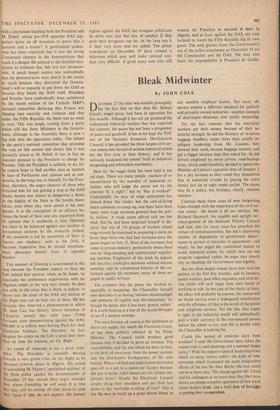Bleak Midwinter •
By JOHN COLE
DECEMBER 25 this year was notable principally for the fact that on that date Mr. Selwyn Lloyd's wages pause had been in operation for five months. Although it has not yet produced the widespread industrial warfare that was expected last summer, the pause has not been a progenitor of peace and goodwill. It has so far kept the TUC out of the National Economic Development Council; it has prodded the three largest civil ser- vice unions into threats of serious industrial action for the first time in their history; and it has seriously weakened the unions' faith in industrial bargaining and arbitration machinery.
How far the wages front has been held is not yet clear. There are many people. unaware of or unconvinced by the morality of industrial re- lations, who will judge the pause not by the criterion 'Is it right?,' but by 'Has it worked?' Undoubtedly the pace of wage settlements has slowed down this winter, but the cost-of-living index continues to creep up, and there have been many more wage increases granted than the pub- lic realises. A trade union official told me this week that he had been surprised himself to dis- cover that out of 156 groups of workers whose wage records he examined in preparing a claim, no fewer than forty-one had had increases-since the pause began on July 25. Most of the increases had come in private industry, particularly where there was no long-standing and sophisticated negotiat- ing machine. Employers of this kind, he argued, felt that they could give increases without anyone noticing; and he complained bitterly of the un- fairness against his members, many of them en- gaged in public services.
The evidence that the pause has worked in- equitably is mounting; the Chancellor himself now describes it as having 'obvious disadvantages and elements of rigidity and discrimination,' al- though he denies that it has been 'grossly unfair.' It is worth looking at a few of the break-throughs to see if a pattern emerges.
The most famous, of course, is the settlement in electricity supply, for which the Electricity Coun- cil has been publicly rebuked by the Prime Minister. The Council could produce good reasons why it decided to grant an increase. The most notable, and the one which we have to face, is the drift of men away from the power stations and the distributive headquarters of the area boards. When a skilled and experienced electrician goes off to a job in a motor-car factory because the pay is better, what lesson can his former em- ployers draw? Should the Electricity Council simply shrug their shoulders and put their loss down to the inevitable working of fate? This is not the way to build up a good labour force, as any sensible employer knows. Yet many ob- servers assume a different standard for publicly and privately owned industries—another example of doctrinaire obsession over public ownership.
Yet the fact remains that the electricity workers got their money because of their in- dustrial strength. So did the Ministry of Aviation baggage handlers; under more than usually in- telligent leadership from Mr. Cousins, they showed their teeth, became baggage masters, and got a bigger increase than they asked for. So did drivers employed by many private road-haulage firms, which understandably decided to ignore the Minister of Labour's operative date of January for a pay increase as they could buy themselves free of industrial trouble by paying the extra money just six or eight weeks earlier. The pause may be a policy, but business, clearly, remains business.
Contrast these three cases of men bargaining from strength with the experience of the civil ser- vice unions : the lesson is all too obvious. Mr. Richard Hayward, the capable and upright sec- retary-general of the National Whitley Council staff side, who for many years has preached the virtues of constitutionalism, has led a depressing number of deputations to government depart- ments to protest at breaches of agreements; and wisely, he has urged the constituent unions to avoid industrial action, for which they are not properly organised; rather, he urges they should rely on shaming the Government into legality.
But the three largest unions have now read the pattern of the first five months; and in January, postal workers, post office engineers, and civil ser- vice clerks will each begin their own forms of working to rule. In the case of the clerks, at least, the effect will probably be uneven; the nation will no doubt survive even a widespread interference with the efficiency (if that is the word) of the postal and telephone services. Yet the idea that might is right in the industrial world will undoubtedly gain a wider currency in the non-manual unions before the winter is out; and this is hardly what the Chancellor is looking for.
Could this spread of cynicism have been avoided? Could the Government have taken the unions with it, into planning and a national wages policy? With the negative kind of leadership from which so many unions suffer—the kind of con- servatism which frustrated the most imaginative efforts of the late Sir Alan Birch—the task could not have been easy. The charge against Mr. Lloyd and his colleagues is no more than that they have shown an almost complete ignorance of how trade union leaders think, and a total lack of foresight in getting their co-operation.


























 Previous page
Previous page